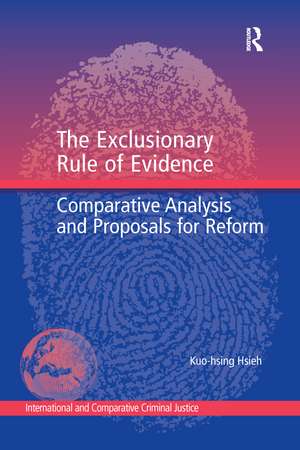The Exclusionary Rule of Evidence: Comparative Analysis and Proposals for Reform: International and Comparative Criminal Justice
Autor Kuo-hsing Hsiehen Limba Engleză Paperback – 30 iun 2020
| Toate formatele și edițiile | Preț | Express |
|---|---|---|
| Paperback (1) | 259.98 lei 6-8 săpt. | |
| Taylor & Francis – 30 iun 2020 | 259.98 lei 6-8 săpt. | |
| Hardback (1) | 823.44 lei 6-8 săpt. | |
| Taylor & Francis – 28 noi 2014 | 823.44 lei 6-8 săpt. |
Preț: 259.98 lei
Preț vechi: 311.41 lei
-17% Nou
Puncte Express: 390
Preț estimativ în valută:
49.75€ • 51.94$ • 41.17£
49.75€ • 51.94$ • 41.17£
Carte tipărită la comandă
Livrare economică 04-18 aprilie
Preluare comenzi: 021 569.72.76
Specificații
ISBN-13: 9780367600051
ISBN-10: 0367600056
Pagini: 264
Dimensiuni: 156 x 234 mm
Greutate: 0.45 kg
Ediția:1
Editura: Taylor & Francis
Colecția Routledge
Seria International and Comparative Criminal Justice
Locul publicării:Oxford, United Kingdom
ISBN-10: 0367600056
Pagini: 264
Dimensiuni: 156 x 234 mm
Greutate: 0.45 kg
Ediția:1
Editura: Taylor & Francis
Colecția Routledge
Seria International and Comparative Criminal Justice
Locul publicării:Oxford, United Kingdom
Cuprins
The Exclusionary Rule of Evidence
Notă biografică
Kuo-hsing Hsieh is Assistant Professor of Law at the National Chung Cheng University, Taiwan, where his teaching and research focus on criminal law and procedure, and human rights law. He read law at the University of Edinburgh where he received his Ph.D. degree, having been awarded a College of Humanities and Social Science Scholarship, School of Law Scholarship, W.A. Wilson Education Fund and North American Taiwan Studies Association Scholarship. His principal research interest is the broad field of criminal justice, where his work ranges from substantive criminal law to criminal procedure to the administration of criminal justice, with a special focus on issues related to comparative law.
Recenzii
’Kuo-hsing Hsieh takes on the very topical issue of state torture and how to prevent it. Using the vehicle of the Exclusionary Rule, the author explores the reasons why China continues to experience continuing problems of official torture and how the Exclusionary Rule can be used to prevent it. With the United Kingdom and the United States as comparative examples, Hsieh lays out the problem and provides a solution. A most timely book.’ Robert C. Berring, Berkeley Law School, University of California, USA ’This book is an exhaustive collection of primary sources and discussions of theoretical perspectives on various aspects of exclusionary rules in the US, the UK and China, and it is an equally exhaustive collection of pertinent Chinese materials that lay out clearly and distinctly the differences between these legal systems. The author makes a heartfelt plea for change in China, and this book may be a valuable contribution to that effort.’ Ronald J. Allen, Northwestern University, USA
Descriere
This book argues the need for the establishment of an exclusionary rule of evidence in China as a means of protecting the people from police wrongdoing. In support of the argument and as a means of developing a suitable process, the author takes a comparative approach to the foundation and development of the exclusionary rule in the UK and the USA,















